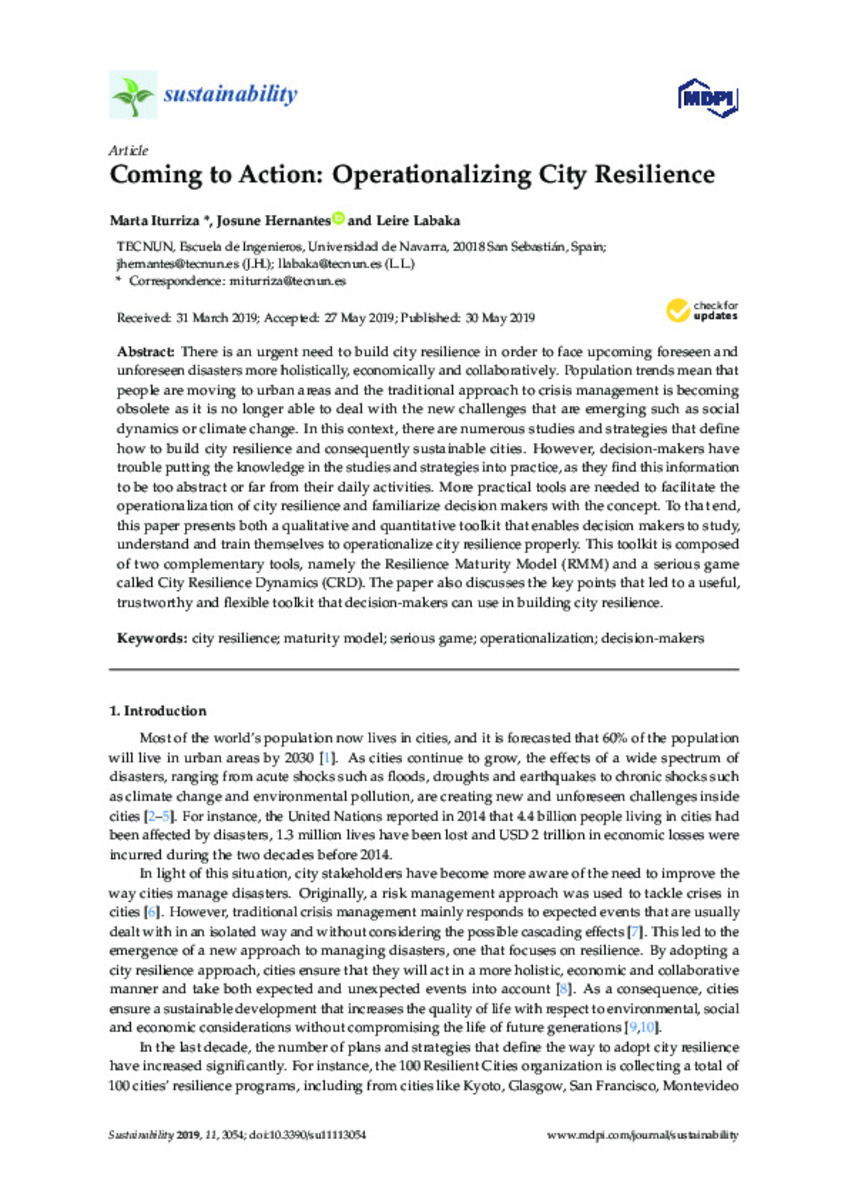Registro completo de metadatos
| Campo DC | Valor | Lengua/Idioma |
|---|---|---|
| dc.creator | Iturriza, M. (Marta) | - |
| dc.creator | Hernantes-Apezetxea, J. (Josune) | - |
| dc.creator | Labaka-Zubieta, L. (Leire) | - |
| dc.date.accessioned | 2022-01-14T07:26:40Z | - |
| dc.date.available | 2022-01-14T07:26:40Z | - |
| dc.date.issued | 2019 | - |
| dc.identifier.citation | Iturriza, M. (Marta); Hernantes-Apezetxea, J. (Josune); Labaka-Zubieta, L. (Leire). "Coming to Action: operationalizing city resilience". Sustainability. 11 (11), 2019, 3054 | es |
| dc.identifier.issn | 2071-1050 | - |
| dc.identifier.uri | https://hdl.handle.net/10171/62723 | - |
| dc.description.abstract | There is an urgent need to build city resilience in order to face upcoming foreseen and unforeseen disasters more holistically, economically and collaboratively. Population trends mean that people are moving to urban areas and the traditional approach to crisis management is becoming obsolete as it is no longer able to deal with the new challenges that are emerging such as social dynamics or climate change. In this context, there are numerous studies and strategies that define how to build city resilience and consequently sustainable cities. However, decision-makers have trouble putting the knowledge in the studies and strategies into practice, as they find this information to be too abstract or far from their daily activities. More practical tools are needed to facilitate the operationalization of city resilience and familiarize decision makers with the concept. To that end, this paper presents both a qualitative and quantitative toolkit that enables decision makers to study, understand and train themselves to operationalize city resilience properly. This toolkit is composed of two complementary tools, namely the Resilience Maturity Model (RMM) and a serious game called City Resilience Dynamics (CRD). The paper also discusses the key points that led to a useful, trustworthy and flexible toolkit that decision-makers can use in building city resilience. | es_ES |
| dc.description.sponsorship | This research was funded as part of the project Smart Mature Resilience by the European Union’s Horizon 2020 research and innovation program under grant agreement no. 653569. | es_ES |
| dc.language.iso | eng | es_ES |
| dc.publisher | MDPI AG | es_ES |
| dc.rights | info:eu-repo/semantics/openAccess | es_ES |
| dc.subject | City resilience | es_ES |
| dc.subject | Maturity model | es_ES |
| dc.subject | Serious game | es_ES |
| dc.subject | Operationalization | es_ES |
| dc.subject | Decision-makers | es_ES |
| dc.title | Coming to Action: operationalizing city resilience | es_ES |
| dc.type | info:eu-repo/semantics/article | es_ES |
| dc.description.note | Licensee MDPI, Basel, Switzerland. This article is an open access article distributed under the terms and conditions of the Creative Commons Attribution (CC BY) license (http://creativecommons.org/licenses/by/4.0/). | es_ES |
| dc.identifier.doi | 10.3390/su11113054 | - |
| dadun.citation.number | 11 | es_ES |
| dadun.citation.publicationName | Sustainability | es_ES |
| dadun.citation.startingPage | 3054 | es_ES |
| dadun.citation.volume | 11 | es_ES |
Ficheros en este ítem:
Estadísticas e impacto
Los ítems de Dadun están protegidos por copyright, con todos los derechos reservados, a menos que se indique lo contrario.






